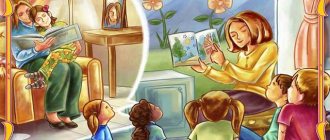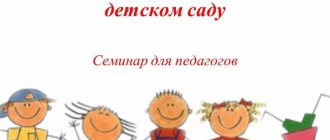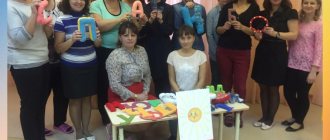Methodological development of a workshop for teachers of preschool education materials on the topic
Municipal budgetary preschool educational institution combined type kindergarten No. 32 “Forest Fairy Tale”
Proletarsk, Proletarsky district, Rostov region
Methodological development of a workshop for teachers of MBDOU
“Interaction between a teacher and students’ parents: formality or dialogue?”
teacher: Ivleva N.G.
September, 2015
Abstract of the methodological development of a workshop for teachers of MBDOU.
Topic: “Interaction between a teacher and students’ parents: formality or dialogue?”
Goal: To promote the teacher’s awareness of his position in communication with parents.
Objectives: To update the knowledge of teachers on issues of organizing cooperation with parents of students; develop initiative and creativity among teachers.
Form: workshop seminar.
Time: 1 hour.
Preliminary work: survey of teachers.
Progress:
1. Greetings to the participants of the seminar/workshop. Relevance of the topic.
The interaction of teachers with the families of pupils is one of the most important conditions for the development of a child’s personality and his socialization in the course of public and home education. Each family has a lot of individual characteristics and reacts differently to outside interference. In this regard, it is necessary to select different approaches to interaction with different types of families.
Analyzing the current situation in the sphere of interaction between teachers and families, the following facts can be noted:
• Focus on the family in general, without taking into account differences in age, education, cultural orientation, views on raising children;
• Inability to set specific goals when working with parents and choose adequate methods;
• Underestimation of the role of the family in raising children and the resulting formality in working with parents;
• Using mainly traditional methods of communication with parents.
• The main reasons for interaction between parents and teachers are situational related to the child’s behavior and education (what he did, how he slept, what he ate, how he felt) and organizational (bring something, learn at home, pay for visiting the kindergarten, helping a group)
The main task of interaction between the teacher and the family is to find ways to solve all kinds of problems. Traditional forms of working with parents do not provide such an opportunity, since for the most part they are created to influence a wide group of parents of the entire group.
In order for work with parents not to be a formality, relations between family and kindergarten should be built on the basis of the following concepts:
— “cooperation” is communication on equal terms, where no one has the privilege to indicate, control, or evaluate.
— “interaction” is a way of organizing joint activities through communication, based on the openness of both parties.
2. Interaction between preschool educational institutions and parents involves a variety of forms and methods of work. It is aimed at exchanging experiences, increasing the pedagogical competence of parents, and developing their skills in raising children.
All types of meetings with parents can be divided into several types.
•Organizational
, at which work plans are drawn up and approved, a parent committee is elected, public assignments are distributed, and events are developed with the participation of parents;
•Thematic
dedicated to discussing the most pressing and complex issues of upbringing, development and education of group students;
•Debate meetings
aimed at identifying and reconciling different points of view in the community of parents and teachers;
•Workshop meetings,
aimed at parents mastering specific techniques and methods of family education and assisting children in education.
•Reporting, final
, with the goal of drawing the attention of parents to the positive and negative phenomena of the group’s life.
• Information and educational, dedicated to the consideration of problems related to education and training.
Practical exercise “Forms of communication with parents.”
A variety of forms and methods of work helps to find common ground with different categories of parents. Sometimes teachers cannot abandon outdated forms and methods due to their professional habits.
Now we will try to create a classification of methods of working with parents, using the translation of traditional (formal) forms of cooperation into non-traditional (informal) ones.
Traditional forms of work Non-traditional forms of work
Parent meetings Round table, question and answer evening, interest meetings, teachers' lounge, games, hikes, parent parties
15-minute conversations, discussions, tea breaks
Consultations Helpline, oral journals, workshops, Meetings of fathers, meetings of mothers, “Discussion swings”, “round table with sharp corners”.
Questioning Reflective sheets, video survey, testing
quick poll
Information and poster material Issue of a preschool educational institution newspaper, memos, booklets, advertisements, exhibitions and presentations, relay albums, etc.
Exercise “Enter the circle”
Goal: to demonstrate to educators the need for a flexible attitude to communication with parents.
Procedure: All teachers stand in a circle and hold hands tightly - this is a circle of parents. One participant remains behind the circle - the teacher. He must convince the players to let him into the circle so that they want to do it, that is, choose the right tone of address and the necessary words.
Execution Analysis:
-Was it easy for you to enter the vicious circle? Did it succeed the first time? Why?
-What feelings did you experience while doing the exercise?
-What do you think, when communicating with the parents of the children in your group, are you in the circle or outside the circle?
3. There are a number of methods that promote the integration of parents and teachers and make communication between both parties informal.
•Exchange of correspondence cards
At the end of the day, the teacher writes down information about the child on a pre-prepared cardboard card. In this case, a mandatory condition must be observed: information is presented only in a positive form. Then the parents must fill out their part of the card, also writing down what the child did in the evening at home, what successes and achievements he had. The teacher, having received new information about the child in the morning, can also draw certain conclusions, as well as encourage the child, based on the information received from the parents. This contributes to the establishment of mutual understanding and trusting relationships between the teacher and the parent, and the emergence of consistency in the actions of adults.
•“Flower of Achievement”
In the daily information for parents, you can attach a flower cut out of bright cardboard to your locker in the locker room. In the center of the flower there is a photograph of the child, and on the petals corresponding to the days of the week there is information about the child’s results, which he is proud of. In younger groups, teachers enter the text, and in the preparatory group, filling out the achievement flowers can be entrusted to children. Parents, coming to kindergarten in the evening, rush to find out what their child has achieved during the day, what his progress is. Here, several pedagogical tasks are solved at once: establishing mutual understanding between the family and teachers, increasing the child’s self-esteem, increasing the knowledge of parents.
•“Album – relay race”
Teachers invite the parents of the group to talk about their family traditions, rules, and methods of education on the pages of an “album”, which can be presented in the form of a folder with files. The story can correspond to a specific topic and be supplemented with photographs of the family. This non-traditional form of work develops interaction between parents and teachers and expands the self-awareness of parents.
•"Mailbox"
This is a form of correspondence between teachers and parents, through which questions, suggestions, and advice from parents on various aspects of the upbringing and development of children are added to the Box. Answers to questions can be addressed to preschool specialists, documented at the stand, or an individual conversation with parents can be organized.
•Memos
This is a well-structured short text that reminds of something, and also encourages parents to consciously raise children in the family and cooperate with the kindergarten.
There are also a number of non-traditional methods that can be used to activate parents in traditional meetings.
•"Spicy dish"
Short questions on the topic of the meeting, placed in pepper shakers, are distributed to parents accompanied by music. Time to respond – 1-3 minutes. Parents answer only if they wish.
•“Successful communication”
begins with the words: “I’m proud...”, “I’m pleased to say...”, “I’m good at...”, “I like myself...”, etc. The opportunity to talk about your positive qualities is extremely rare, and this technique increases self-esteem , teaches you to look for the positive in yourself.
•"Interview"
. One of the participants in the parent meeting sits in the center of the circle. For a while, he becomes the Minister of Education, the head of a preschool educational institution or a teacher, etc. The group can ask him 3-5 questions, one way or another related to the topic of the meeting.
•“Question header”
The essence of the task is that parents write questions-notes for each other, which they put in a hat, then take turns taking them out, answering them and passing the hat on.
4. CONCLUSIONS OF THE SEMINAR:
The effectiveness of interaction between a teacher and parents largely depends on the positive attitude of both parties, a flexible individual approach, and the ability to attract interest through informal communication methods.
Annex 1
Questionnaire for teachers
Dear teachers!
Please take part in the survey in order to study the characteristics of the teacher’s work with parents and the difficulties that you experience in this complex aspect of the activity. Your sincere and complete answers will allow us to provide targeted methodological assistance in preparing for interaction with parents.
1. Do you consider it necessary to work with parents of students in preschool educational institutions? Justify your opinion.
2. Do you experience difficulties in organizing communication with your parents?
3. What are the reasons for these difficulties?
-lack of knowledge on the part of the teacher,
- inability to enter into dialogue,
-excessive shyness, timidity,
- parents’ misunderstanding of the intrinsic value of the preschool period,
other
4. What forms of communication do you use in your work?
5. Do you think special training is needed for educators to work with parents?
6. If so, what do you think it should be?
7. Name the non-traditional forms of working with parents that you use in practice.
Ticket No. 28. Seminars and consultations in preschool educational institutions as a form of methodological work
Seminars and workshops remain the most effective form of methodological work in kindergarten. The annual plan of the preschool institution determines the topic of the seminar and at the beginning of the school year the head draws up a detailed plan for its work. The leader of the seminar can be the head or senior teacher, or invited specialists. A seminar as a form of methodological work differs from the seminar practiced in higher educational institutions.
The first distinguishing feature is its duration. It can include one or several classes. Sometimes an ongoing workshop is planned for a long period, such as several months or even an academic year. The second important feature is the location where it is held. This could be a teaching room in a kindergarten, a group room, or other places (museum, exhibition hall, public garden, etc.) depending on the goals and objectives that the seminar leader must solve. The third feature is the nature of the didactic tasks that are solved during the seminar classes. This is both an educational activity to systematize and improve knowledge, and work to develop skills. In addition, during the seminar the tasks of disseminating teaching experience are solved.
The fourth sign is the source of information. This is the word (reports and co-reports of the participants), and actions (completing various practical tasks at the seminar), and a visual demonstration on the topic of the seminar, and pedagogical analysis.
Consequently, the seminar is not limited to a specific time frame and is not associated with a permanent location.
A seminar can be considered effective if it helps to quickly and timely make changes to the educational process.
Properly organized preparation for it and preliminary information play a big role in the effectiveness of the seminar. The topic of the seminar should be relevant to a specific preschool institution and take into account new scientific information.
If the seminar is long, then it is good to prepare a memo for the participants of the seminar, which indicates the topic, place and order of holding, a list of questions that need to be thought about, and a mandatory list of literature that is useful to get acquainted with in advance. It is important to think through methods and forms of including all seminar participants in an active discussion of the topic. For this, situational tasks are also used, working with punched cards, discussing two opposing points of view, working with regulatory documents, game modeling methods, etc. The seminar leader must clearly think through the tasks for each topic of the lesson and evaluate their implementation. At the end of the seminar, you can arrange an exhibition of the teachers’ works.
Consulting
Of the various forms of methodological work in kindergarten, such a form as consulting teachers has become especially firmly established in practice. Individual and group consultations; consultations on the main areas of work of the entire team, on current problems of pedagogy, on requests from educators, etc.
Any consultation requires training and professional competence from the senior educator.
Useful advice or timely consultation corrects the teacher’s work.
The main consultations are planned in the institution's annual work plan, but individual consultations are held as needed.
Using different methods when conducting consultations, the senior educator not only sets the task of transferring knowledge to teachers, but also strives to form in them a creative attitude to activity.
Thus, with a problematic presentation of the material, a problem is formed and a way to solve it is shown.
To stimulate the attention of educators and encourage them to follow the logic of presentation, it is useful to formulate questions at the beginning of the consultation. Questions addressed to teachers during the consultation process help them comprehend their experience from the point of view of scientific conclusions, express their thoughts, guesses, and formulate a conclusion.
Depending on the level of qualification of teachers, the senior educator determines to what extent it is possible to draw on knowledge from their experience or limit oneself to one’s own explanation.
When exchanging experiences between educators, identifying knowledge, and analyzing specific situations, the method of heuristic conversation can be used. During the conversation, individual provisions of the read methodological literature are revealed in more detail, explanations are given on those issues that are of greater interest to teachers, the erroneousness of their opinions and shortcomings of professional experience are revealed, the degree of understanding and assimilation of knowledge is revealed, and orientation towards further self-education is carried out.
The one who prepares the consultation must draw up a reasonable plan for the conversation, allowing him to clearly imagine what new knowledge the educators will receive and what conclusions they will come to. When organizing a heuristic conversation, it is advisable to alternate the statements of experienced and novice educators. A heuristic conversation conducted with the aim of transferring new knowledge requires serious preparation and thinking through the entire course of the lesson. During the consultation, the discussion method is used.


